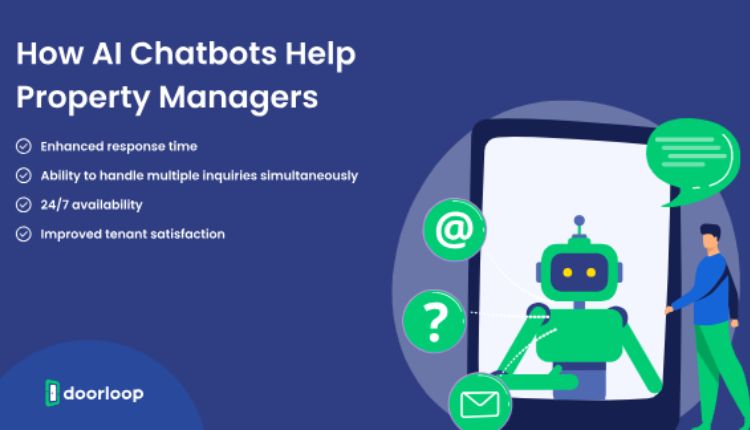
AI Chatbots
The real estate industry is increasingly adopting innovative technologies to streamline operations and enhance tenant interactions. Among these advancements, AI-powered chatbots have become a game-changing tool for tenant communication. Ballast Investments reviews highlight the firm’s leadership as a real estate investment company managing a $2 billion portfolio and utilizing these technologies to boost tenant engagement and operational efficiency. These digital assistants efficiently handle routine inquiries, deliver instant responses, and simplify communication between property managers and tenants. However, while AI chatbots offer significant advantages, they also have limitations that property managers must thoughtfully address to achieve the optimal balance between automation and personalized service.
Understanding how AI chatbots function and their role in tenant communication allows property managers to maximize their potential while addressing their limitations. This approach ensures efficiency without compromising tenant satisfaction.
The Role of AI Chatbots in Tenant Communication
AI chatbots simulate human-like conversations using natural language processing (NLP) and machine learning. In real estate, these tools are commonly used to answer tenant questions, process maintenance requests and share updates about property policies or services. Chatbots operate seamlessly across various platforms, including property management systems and communication apps, ensuring tenants have 24/7 accessibility.
These tools excel at handling repetitive tasks, such as answering questions about rent payments, lease terms or utility billing. By automating these routine interactions, property managers can reduce their workload and focus on addressing complex or sensitive issues. Additionally, chatbots collect and organize tenant data, providing insights into tenant preferences and recurring concerns, which can inform property management strategies.
Benefits of AI Chatbots in Tenant Communication
AI chatbots offer significant advantages, starting with their 24/7 availability. They ensure tenants receive instant answers and reduce delays in addressing concerns. By automating routine tasks, chatbots save time and resources, making them a cost-effective solution for managing large portfolios. Their consistent and accurate responses minimize miscommunication, enhancing service quality.
Chatbots also improve the tenant experience with quick response times and the ability to handle multiple queries simultaneously. This convenience fosters trust and satisfaction among tenants. Additionally, the data collected from interactions provides property managers with valuable insights to refine services and address recurring issues effectively.
Limitations of AI Chatbots
While AI chatbots offer many benefits, they also have limitations that property managers must consider. One of the primary drawbacks is their lack of personalization. Chatbots are effective for routine tasks but struggle to address complex or emotionally sensitive issues, leaving some tenants frustrated when they cannot speak with a human representative.
Another limitation is the chatbot’s scope of knowledge. These tools rely on pre-programmed responses and may provide incomplete or irrelevant answers to questions outside their knowledge base, requiring human follow-up. Additionally, chatbots are dependent on technology, and technical issues like server outages or software glitches can disrupt their functionality, potentially causing dissatisfaction among tenants.
Tenant resistance to automation is another challenge. While some tenants value the convenience of chatbots, others may prefer direct communication with a property manager, especially for issues requiring empathy or detailed explanations. Furthermore, despite their advanced programming, chatbots occasionally misinterpret tenant queries, leading to miscommunication and the need for human intervention.
Balancing Automation and Human Interaction
To address these limitations, property managers should adopt a balanced approach that combines automation with human interaction. Chatbots can efficiently manage routine tasks, but human oversight is essential for handling complex or nuanced concerns. This balance ensures that tenants receive the best possible service while reducing the burden on property managers.
One effective strategy is to integrate chatbots with a clear escalation process. When a tenant’s query exceeds the chatbot’s capabilities, the system should seamlessly transfer the interaction to a human representative. This approach ensures that tenants receive timely and appropriate assistance, regardless of the complexity of their concerns.
Property managers can also leverage data collected by chatbots to improve human-led services. For example, identifying common tenant issues can inform staff training and resource allocation, leading to more effective problem-solving. By combining the strengths of AI technology with personalized service, property managers can enhance tenant satisfaction and operational efficiency.
Best Practices for Implementing AI Chatbots
Successful implementation of AI chatbots requires careful planning and adherence to best practices. It is crucial to set clear expectations with tenants. Property managers should inform tenants about the chatbot’s capabilities and limitations and provide instructions on how to escalate concerns to a human representative when necessary.
Personalizing the chatbot experience can also improve tenant interactions. While chatbots cannot replicate human empathy, addressing tenants by name and tailoring responses to specific queries can make conversations feel more engaging. Another essential practice is regularly updating the chatbot’s knowledge base. Keeping responses accurate and relevant ensures that the chatbot remains a reliable resource for tenant inquiries.
Monitoring and evaluating the chatbot’s performance helps property managers identify areas for improvement. Metrics such as response times, resolution rates and tenant satisfaction provide valuable insights into the chatbot’s effectiveness. Additionally, prioritizing data security is essential to protect tenant information and ensure compliance with privacy regulations.
The Future of AI Chatbots in Real Estate
As AI technology advances, chatbots are expected to become even more sophisticated, expanding their role in tenant communication. Enhanced emotional intelligence may enable chatbots to better understand and respond to tenant emotions, improving their ability to handle sensitive situations. Voice-enabled chatbots and multilingual capabilities will further increase accessibility, making tenant communication more inclusive.
Ryan Brewer, Co-Founder and Managing Principal at Ballast Investments, highlights the importance of innovation in property management, saying, “We’ve embraced new operational technology to better streamline maintenance and communication across disparate locations.” This forward-thinking perspective highlights how AI chatbots are poised to play an increasingly prominent role in the real estate industry, transforming how property managers interact with tenants.
AI chatbots are reshaping tenant communication by providing efficient, responsive and cost-effective solutions for property managers. Their ability to handle routine tasks and operate 24/7 enhances tenant satisfaction while allowing property managers to focus on more complex issues. However, their limitations—such as a lack of personalization and occasional miscommunication—highlight the importance of balancing automation with human interaction.
By implementing best practices, property managers can effectively leverage chatbots to improve tenant experiences and streamline operations. As technology continues to evolve, AI chatbots will play an increasingly vital role in real estate, helping property managers deliver exceptional service and adapt to tenants’ changing needs.









